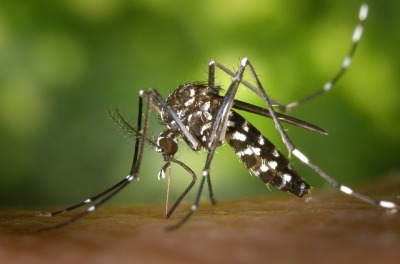
In the face of the Zika epidemic the World Health Organization (WHO) has issued new recommendations for individuals at risk of contracting the virus either through mosquito bites or through sexual contact with an infected person. If someone has traveled to an area where Zika is present, the WHO recommends abstinence or consistent condom use for at least eight weeks or up to six months if a partner shows symptoms. (Only 20% of people infected with the virus are symptomatic.) But for women of childbearing age living in areas affected by the virus, the WHO urges them to speak with their health providers about possibly delaying pregnancy, presumably indefinitely. The Zika virus has been linked to devastating birth defects including microcephaly.
After issuing the revised guidelines Nyka Alexander, spokesperson for the WHO, clarified that the purpose of them was not to discourage all at-risk couples from conceiving, but rather to ensure that they consider the Zika virus and its potential impacts on the timing of pregnancy. “Whether and when to become pregnant should be a personal choice made on the basis of information and access to affordable, quality health services,” said Alexander.
For pregnancy to be a personal choice, women and men must have access to the tools, information, and resources they need to prevent, delay, or plan it. Worldwide more than 220 million women want to avoid pregnancy but have an unmet need for reliable, safe contraceptive methods. The Zika virus has brought significant attention to what has been a public health crisis and an ethical tragedy for decades: that despite modern medical advances 85 million women experience unintended pregnancies each year.
Too often we speak of unintended pregnancies as if they were a mere annoyance or inconvenience to the women and families who experience them. We comfort ourselves by blaming the actions or inactions of the individuals involved and shrug our shoulders at the resulting difficulties they face. Even Pope Francis, lauded by some as progressive, compared abortion to mafia killings—during a press conference on the Zika virus no less.
Will the Zika epidemic elicit a more compassionate response from the global faith community? Given the Pope’s comments on abortion I am not optimistic about the institution of the Catholic Church. As for my own denomination, The United Methodist Church, I have little hope there as well. Last month the General Conference voted to sever its ties with the Religious Coalition for Reproductive Choice, a national organization devoted to ensuring reproductive health, rights, and justice for all people.
Our institutions fail to make the connections between their faith values of love and justice and the reality of people’s complicated, lived experiences that challenge us as people of faith to live into those values. One can theoretically and philosophically believe that abortion is wrong or that contraception interferes with the will of God, but what does that same person say in the face of the pregnant woman infected with the Zika virus or for that matter, any other difficult set of health circumstances?
What we theologically claim about life and God has real and serious consequences on the lives of women and their families. As the threat of Zika increases we do not have time to debate over which health care services women and their families deserve. Instead we ought to spend our energy and resources ensuring that pregnancy is a choice and supporting families in making the health decisions that are right for them.
Katey Zeh, M.Div is a strategist, writer, and educator who inspires intentional communities to create a more just, compassionate world through building connection, sacred truth telling, and striving for the common good. She has written for outlets including Huffington Post, Sojourners, Religion Dispatches, Response magazine, the Good Mother Project, the Journal for Feminist Studies in Religion, and the United Methodist News Service. Find her on Twitter at @kateyzeh or on her website www.kateyzeh
communities to create a more just, compassionate world through building connection, sacred truth telling, and striving for the common good. She has written for outlets including Huffington Post, Sojourners, Religion Dispatches, Response magazine, the Good Mother Project, the Journal for Feminist Studies in Religion, and the United Methodist News Service. Find her on Twitter at @kateyzeh or on her website www.kateyzeh


“Even Pope Francis, lauded by some as progressive, compared abortion to mafia killings—during a press conference on the Zika virus no less.” !!!
“One can theoretically and philosophically believe that abortion is wrong or that contraception interferes with the will of God, but what does that same person say in the face of the pregnant woman infected with the Zika virus or for that matter, any other difficult set of health circumstances?” As Judith Plaskow once said, “the right question is theological.” There is a connection between the idea that every conception is the will of God and opposition to contraception and abortion. We need to talk theologically as well as practically, because theology does influence practice!!
LikeLiked by 1 person
If we say “contraception interferes with the will of God,” what does “will of God” mean?
Basically it indicates something is meant to be, there’s a reason for it, that is, in terms of the good of the whole. There are changes in our world also that accord with over-population, and that seem to be happening naturally. For instance, smaller families, with maybe two children, instead of eight, the acceptance of homosexuality, the legality of abortion, smaller, more affordable living spaces, or more apartment buildings, instead of huge homes with more rooms than anyone needs.
LikeLike
I remember a preacher saying: “The Will of God is Love, nothing more, nothing less”. I believe we/ourselves have to make our decisions how to live this and grow in it. No pope or other leader has authority to demand control of our conscience, nor we the responsibility to surrender it to them.
LikeLike
“Our institutions fail to make the connections between their faith values of love and justice and the reality of people’s complicated, lived experiences that challenge us as people of faith to live into those values.”
Great post, Katey.
LikeLike
You’ve made a connection I’ve never thought of. Of course, I think it’s nobody’s business but that of the woman herself whether or not conceives and what she does if she learns that her child may be born with a birth defect. Thanks for writing this. I agree that institutions seldom care–or even know–about the complications of individuals’ lives.
LikeLike
Estoy de acuerdo con todo esto que esplican, Creo que deben de no en barasarce asta que le en cuentren la cura al viro.
LikeLike
https://www.theguardian.com/world/2016/jun/22/abortion-information-zika-virus-birth-defects-latin-america-study?utm_source=esp&utm_medium=Email&utm_campaign=GU+Today+USA+-+morning+briefing+2016&utm_term=178839&subid=15780678&CMP=ema_a-morning-briefing_b-morning-briefing_c-US_d-1
Women are seeking abortion pills online in countries where abortion is illegal. Siggghhhhhhhhhhhhhhhhhhhhhhh
LikeLike